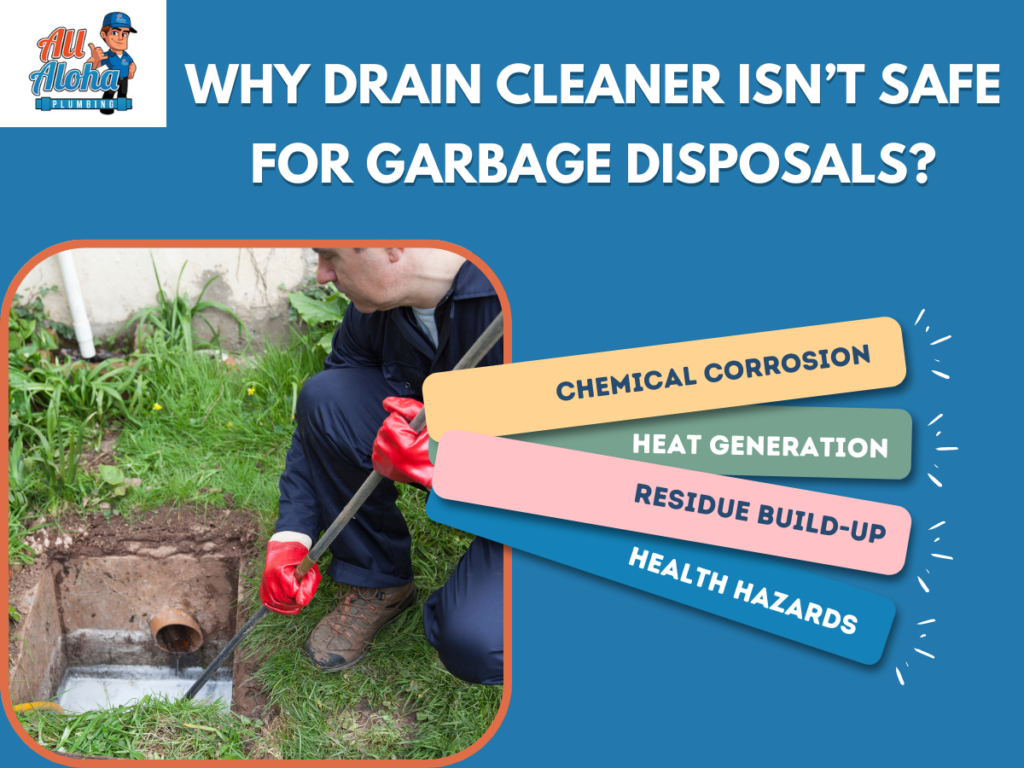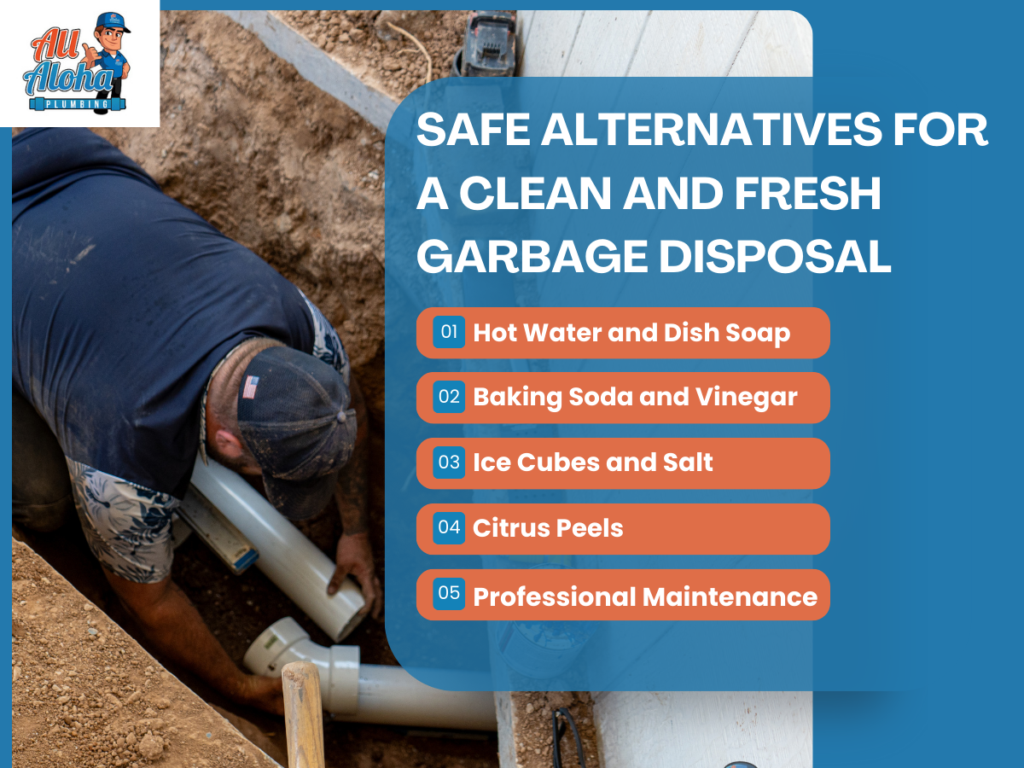Garbage disposals are a modern kitchen convenience, designed to handle food waste and keep your sink clean effortlessly. However, like any appliance, they require regular maintenance to perform efficiently. One question that often arises is, Can I put drain cleaner in garbage disposal? While drain cleaners may seem like a quick solution for clogged or smelly disposals, using them can lead to serious issues. Chemical-based drain cleaners, in particular, can damage your disposal unit, corrode your plumbing, and even pose health risks due to toxic fumes.
Here, we’ll learn why drain cleaners are unsafe for garbage disposals, their dangers, and effective alternatives to keep your disposal clean and fresh. Understanding these facts will not only save you from costly repairs but also ensure your kitchen remains a safe and efficient space. Read on to learn the safest ways to maintain your garbage disposal and avoid unnecessary risks.
Can I Put Drain Cleaner in Garbage Disposal?
The short answer is no. Drain cleaners, while effective for clearing blockages in pipes, are not suitable for use in garbage disposals. These products, whether they are chemical-based or enzymatic, can cause more harm than good. Understanding the reasons why they are unsafe for garbage disposal can help you make informed decisions, protect your appliance, and maintain a safe and efficient kitchen environment.
Enzymatic Drain Cleaners and Residue Build-Up
Enzymatic cleaners use bacteria and enzymes to digest organic waste. While they are less harsh than chemical cleaners, they are not designed to handle the unique mechanics of garbage disposal. Enzymatic cleaners can leave behind a sticky residue, which accumulates over time and contributes to further clogs or decreased efficiency.
Potential Damage to Plumbing
Garbage disposals are typically connected to pipes made from PVC, metal, or other materials. Chemical reactions caused by drain cleaners generate heat and can corrode or weaken these pipes, leading to leaks or bursts. Even if the disposal itself survives, the plumbing system can suffer significant damage.
Health Risks for You and Your Household
Drain cleaners can pose a direct threat to your health. When used in garbage disposals, the interaction between the chemicals, food residue, and water can release harmful fumes. These fumes can irritate your skin, eyes, and respiratory system, especially in confined kitchen spaces.
Worsened Clogs Instead of Solutions
Contrary to popular belief, drain cleaners may not always resolve clogs effectively. In garbage disposals, food particles, grease, and debris often get caught in areas unreachable by the liquid cleaner. Instead of solving the problem, the cleaner may worsen it by adding to the residue or compacting the blockage.
Long-Term Costs and Repairs
The initial appeal of drain cleaners lies in their convenience. However, the long-term costs of repairing or replacing a damaged garbage disposal or plumbing system far outweigh the short-term benefits of using these products. A single use of a chemical drain cleaner can shorten the lifespan of your disposal and lead to expensive repairs down the line.

Why Drain Cleaner Isn’t Safe for Garbage Disposals?
Garbage disposals are essential kitchen appliances, designed to break down food waste efficiently. However, when they become clogged or emit unpleasant odors, reaching for a drain cleaner may seem like a quick fix. Unfortunately, using drain cleaners in garbage disposals is not safe and can lead to serious problems for your appliance, plumbing system, and even your health.
Chemical Corrosion
Most drain cleaners, especially chemical-based ones, contain powerful ingredients like lye or sulfuric acid. These chemicals are effective at breaking down clogs in pipes but are far too harsh for the sensitive components of garbage disposal. The disposal unit contains metal parts and components that are not designed to withstand the corrosive nature of these substances. Over time, exposure to such chemicals can cause parts to rust, weaken, or deteriorate, ultimately leading to expensive repairs or the need for a replacement.
Heat Generation
The chemical reactions that make drain cleaners effective in clearing clogs often produce intense heat. While this heat is meant to help break down grease, hair, and other debris, it can have unintended consequences on the internal components of your garbage disposal. The plastic and rubber seals within the unit are particularly vulnerable to heat damage, which can cause them to warp, crack, or fail. This compromises the unit’s functionality and may also result in leaks.
Residue Build-Up
Drain cleaners are not always completely flushed out of your plumbing system, particularly when used in a garbage disposal. Some products leave behind a chemical residue that can stick to the unit’s blades, walls, and other components. Over time, this residue can trap food particles and grease, leading to more frequent clogs. Additionally, the buildup may affect the disposal’s efficiency, making it less effective at grinding waste and potentially creating more significant plumbing issues.
Health Hazards
When drain cleaner is poured into a garbage disposal, it often comes into contact with water and food particles, triggering chemical reactions that release toxic fumes. These fumes can irritate your eyes, skin, and respiratory system, especially if you are working in a poorly ventilated kitchen. The risks are even higher if the cleaner splashes back during use. Accidental exposure to these chemicals can result in serious health problems, making this method far from ideal for resolving garbage disposal issues.
What Are the Dangers of Using Drain Cleaners in Garbage Disposals?
Using drain cleaners in garbage disposals can lead to multiple issues, each of which poses risks to the disposal, your plumbing system, and your wallet.
| Danger | Explanation |
| Damage to Components | Corrosive chemicals can degrade metal, plastic, and rubber parts in the disposal. |
| Pipe Damage | Excess heat and chemicals can weaken pipes, leading to leaks or bursts. |
| Health Risks | Toxic fumes can irritate the skin, eyes, and lungs, especially in enclosed spaces. |
| Ineffectiveness | Instead of solving the problem, drain cleaners can worsen clogs in some cases. |
| Costly Repairs | Damaged disposal units or plumbing systems require expensive repairs or replacements. |
Damage to Components
Drain cleaners are formulated with corrosive chemicals like lye and sulfuric acid, which are designed to break down tough clogs. However, these substances can also corrode the metal, plastic, and rubber parts inside your garbage disposal. Over time, this corrosion weakens the structure of the disposal, causing it to malfunction or fail entirely. Repairing or replacing these components can be costly and inconvenient.
Pipe Damage
The heat generated by the chemical reactions of drain cleaners can weaken your pipes, especially if they’re made from PVC or other sensitive materials. This can lead to cracks, leaks, or even bursts in your plumbing system, requiring extensive repairs. This risk is particularly high if your plumbing system is older or has already been subjected to wear and tear.
Health Risks
When drain cleaners mix with food particles or water inside your garbage disposal, they may emit toxic fumes. These fumes can irritate your eyes, skin, and lungs, especially in poorly ventilated spaces like kitchens. Accidental exposure, such as splashing, can also cause chemical burns, making it hazardous for homeowners attempting to fix clogs themselves.
Ineffectiveness
In some cases, drain cleaners don’t solve the clog problem at all. Instead, they can make it worse by hardening grease or pushing the blockage deeper into the pipes. This results in a more significant clog that may require professional intervention. Additionally, residual chemicals left behind in the garbage disposal can continue to cause damage over time.
Costly Repairs
Using drain cleaners can lead to long-term damage to both the garbage disposal unit and the plumbing system. Whether it’s a corroded component, a cracked pipe, or a completely damaged disposal, the cost of repairing or replacing these parts can quickly add up. Avoiding drain cleaners is a simple way to save money and maintain the integrity of your kitchen’s plumbing system.

What Are the Safe Alternatives for a Clean and Fresh Garbage Disposal?
Maintaining a clean and fresh garbage disposal doesn’t require the use of harsh chemicals like drain cleaners. Instead, there are safer, more effective alternatives that not only protect your disposal unit but also contribute to the longevity of your plumbing system.
Hot Water and Dish Soap
One of the simplest yet most effective cleaning techniques involves hot water and dish soap. Here’s how it works:
- Why It Works: Dish soap is designed to cut through grease, while hot water helps dissolve and wash away grease, oil, and food particles trapped in the disposal.
- How to Use: Pour a mixture of hot (not boiling) water and a few drops of dish soap directly into the disposal. Let it run for a few seconds to allow the soapy water to coat and clean the internal components.
This method is ideal for regular maintenance, keeping your garbage disposal free from light grease build-up and minor debris.
Baking Soda and Vinegar
This natural cleaning combination is a powerhouse for tackling clogs and neutralizing odors:
- Why It Works: Baking soda acts as a mild abrasive, breaking down residue and grime, while vinegar’s natural acidity dissolves organic matter and combats bacteria causing odors.
- How to Use:
- Pour ½ cup of baking soda directly into the disposal.
- Follow with ½ cup of vinegar.
- Allow the mixture to fizz and sit for 15 minutes to loosen debris.
- Flush with hot water to rinse away the loosened particles and grime.
This method is not only eco-friendly but also highly effective for both cleaning and deodorizing your disposal unit.
Ice Cubes and Salt
This method not only cleans but also sharpens the blades of your garbage disposal:
- Why It Works: Ice cubes physically scrub the interior surfaces and blades, while coarse salt acts as an abrasive to remove stuck-on food particles.
- How to Use:
- Place a handful of ice cubes into the disposal.
- Add 2-3 tablespoons of coarse salt (kosher salt or rock salt works best).
- Run the disposal with cold water for a few seconds until the ice is ground down.
This method is perfect for a quick deep clean, as it reaches areas that other methods might miss.
Citrus Peels
Citrus peels not only clean the disposal but leave behind a refreshing, natural scent:
- Why It Works: The natural acidity in citrus peels, such as lemon, orange, or lime, helps dissolve grease and grime. Meanwhile, the oils released from the peels combat odors.
- How to Use:
- Cut a few citrus peels into smaller pieces.
- Place them in the disposal and run it with a small stream of cold water.
This technique freshens up the garbage disposal instantly and gives your kitchen a pleasant, clean aroma.
Professional Maintenance
For long-term care and to address more complex issues, professional maintenance is key:
- Why It Works: Regular inspections and servicing by a licensed plumber ensure your garbage disposal and plumbing system stay in top shape. Professionals can detect early signs of wear and tear or potential clogs that might not be visible to you.
- How to Schedule: Contacting a reliable plumber for periodic maintenance once every 6-12 months is ideal for preventing major problems.
Final Words
So, Can I put drain cleaner in garbage disposal? Using drain cleaners in your garbage disposal might seem like a quick fix for clogs or unpleasant odors, but it comes with serious risks that can outweigh any short-term benefits. Drain cleaners are bad for pipes, especially those containing harsh chemicals, can corrode the internal components of your garbage disposal, damage your plumbing, and even pose health hazards due to toxic fumes. Over time, these damages can lead to costly repairs and a reduced lifespan for your disposal system.
Additionally, regular maintenance, such as running ice cubes and salt through the system, can help keep it clean and functioning efficiently. For stubborn clogs or recurring issues, it’s always best to consult a professional plumber who can address the root cause safely.
By avoiding harmful practices and opting for safe cleaning methods, you can protect your garbage disposal, ensure your plumbing system operates smoothly, and maintain a healthy home environment. Remember, proper care and maintenance go a long way in extending the life of your kitchen appliances while preventing unnecessary expenses.

